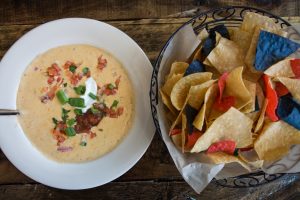Publisher’s Note: This year we are partnering with the Arkansas Cornbread Festival and the UALR department of English for a writing contest open to all UALR students and alumni. Each person is asked to write a short fiction, nonfiction, or poetry piece exploring the intersection of food and culture. The submissions were judged by a panel of UALR writers.
All entries can be found here
Fried Dandelions by Keith Harper
He stared up at her, eyes filled with fear, and a lump formed in the woman’s throat. What had they told him? That they were all monsters? That they ate little children and hated white men? He sat in the leaves, nail-bitten fingers clutching the half-eaten earth-worm he had dug from the muddy furrow in front of him. He was under-weight; she could tell that from one glance. A large blue t-shirt splattered with mud nearly engulfed his small frame, yet hung off his neck in the way he pitched forward so that she could see down past the jutting ribs to his bare legs. The only covering beneath the shirt was a pair of dirty underwear. In November. Her eyes began to fill with tears. This was how they treated their own?
They had moved in some ten or so years ago, one or two at first, and then the whole flock descended. Historically, her part of the woods had been black. A few white people had lived there, but the last of them had moved away over twenty years ago. They had been good neighbors, and respectful. This new lot that had come though, they were mean. They were mean-spirited and their circumstances were mean, too. Whether they were mean because they were poor, or they were poor because they were mean, she had never been able to figure out. They were Klan men though, and they had scared off all her remaining neighbors. The flags had been one thing. The crosses in the meadows, though; they had been another, and the acres around her went up for sale and her friends had moved away.
She was the only one who stayed. It was where her mother and father had lived. Her brothers and sisters and cousins. Where she had married her husband, and where, with a heavy heart, she buried him five years later. It was home, and the mean men had finally figured that out and left her alone, the last black woman in the corner of the county.
They were hateful, but she could hate them back. There was nothing worth leaving this land for. This little boy, though: was he the product of hate? Was fear all that hate could breed? She looked at him and her heart stirred. She thought of her little cousins, of her late husband, of the babies that had never come. Here was a boy, no more than ten, a child in the woods, an old t-shirt around his skinny body and a small pile of dandelions off to the side, his mouth muddy and his eyes wide; here was a baby, a baby that needed love, a baby that needed food, a baby that needed help. Not hers; but still, a baby. Years of ice around her heart conjured by a decade of fiery crosses melted in her love for him.
“Have you ever had fried dandelions?” she called softly to him. He shrank back a little. “I can cook those for you.” The little boy looked over to his dandelions and picked them up. He held them tightly. “I have some rabbits thawing, too. You know where my house is, don’t you?” She looked back the way she had come. “It’s past that meadow where you found the flowers.” He looked past her, as if trying to see the house, then continued staring at her. “I won’t make you; it’s okay if you don’t want to.” She made as if to leave, and then the boy was there, tentatively giving her his hand. She held it gently, and they walked through the trees to the meadow, back to her house.
She turned on the burners and retrieved her skillet. She asked the boy if he would like her to rinse his flowers in the sink. He rinsed them himself, then reluctantly set them on the counter. The rabbits had marinated while she was gone, and now she set the first piece in the skillet. It made a wonderful hiss, and the little boy stood on his toes to watch it cook. When it was finished, she took it out and carefully laid the dandelions in the skillet on their heads. The little boy tried to put one in himself, but the woman stopped him. “No, no, honey; the grease will pop and burn you.” Then, thinking about it, she went to her closet and brought back a footstool and an old hooded sweatshirt nearly as big as the boy. “Here, baby. Would you like this?” He eagerly slipped it over his head, then pushed back the sleeves to find his hands again, and the woman placed the footstool in front of the stove.
She gave him an oven mitt and let him place a piece of rabbit to fry alongside the flowers. He smiled as he laid it down and the aromatic smoke issued upward. She gave him the spatula to flip it when it was time, and again when it was ready. She showed him how to scoop dandelions out of the skillet with it, then let him take over at the stove, telling him only when to flip or lift the food. An old Indian man first taught her family how to fry rabbit with dandelions, the one her grandmother had always called the last Quapaw in the state.
When supper was finished, they settled down at the kitchen table, the little boy stealing glances out the window, as if watching for something. He ate everything on his plate, but hesitated when the woman offered him hers. When they finished, she asked if he would like her to drive him home.
“No!”
He startled her. He told her he would walk back. He didn’t want his daddy to hurt her. She cried as he walked back through the night, then called the cops, hoping they could save this precious point of love, this Klan son who had fried dandelions with her.





